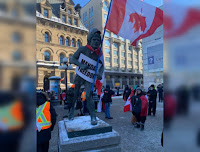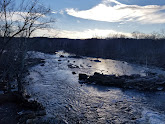This weekend has been a very angering one here in Canada and especially in Ottawa. A mass of protesters, upset at vaccine and mask mandates, have clogged downtown, honked endlessly disturbing residential neighborhoods, and have threatened (but not committed thus far) violence.
These folks have done their best to identify who they really are and to antagonize almost all Canadians. They have carried swastikas, they have carried signs and worn shirts calling for the Prime Minister to be hung, they have bullied restaurants, hotels, and the one mall as they sought to violate the mask mandates, they parked and later danced on the Tomb of the Unknown Soldier, and they temporarily defaced a statue of Terry Fox.The claim is that these are patriotic truckers who can't cross the border now as the government is enforcing a vaccine mandate. Their demands are, well, ignorant and crazed as they have called for the governor general and the Senate (?) to remove the current government and all mask and vax mandates. The Canadian Truckers Association has disassociated itself with these people. Most Canadians, and, yes, most truckers are vaccinated. The organizers are mostly associated with far right groups, and there are legitimate questions about how much of this is an attempt to grift. A significant percentage of Canadian truckers are not white, but the protesters were very white. So, yeah, there is more than a smidge of white supremacy at work (swatiskas and confederate flags tell the tale).
I asked twitter which was more offensive--parking on the War Memorial (this was before people danced on it), hanging signs and upside down flag on Terry Fox (a national hero who walked across Canada to raise money for cancer as it was killing him), or the swastikas.
Which is more offensive to Canadians? #cdnpoli
— Steve Saideman (@smsaideman) January 29, 2022
The swastikas trumped the other two, but I saw many people on twitter appalled at the other two.
Indeed, the day's events led to a bit of a question about Canadian civil-military relations. The head of the Canadian armed forces, General Wayne Eyre, tweeted his shock and horror regarding the dancing on the Tomb of the Unknown Soldier:
I am sickened to see protesters dance on the Tomb of the Unknown Soldier and desecrate the National War Memorial. Generations of Canadians have fought and died for our rights, including free speech, but not this. Those involved should hang their heads in shame.
— General / Général Wayne Eyre (@CDS_Canada_CEMD) January 29, 2022
Is it appropriate for Eyre to speak about a political protest? Depends on where you fit on various debates in civil-military relations. Some think that the military should always stay out of politics, others think that the military is inherently a political actor that should stay out of partisan fights. I am with the latter. Given that the Tomb and the National War Memorial are very much focused on the military and its history, it is not surprising that Eyre was offended and wanted to share his offense. The question may depend on whether one sees the protesters as legitimate partisans in ordinary Canadian politics.
And that is where the Conservative Party of Canada fits in--providing cover and legitimacy for these far right extremists. The CPC leader, Erin O'Toole, met with the truckers as they headed to Ottawa, as he has tried to balance between appealing to mainstream Canada while not offending the far right folks who might flee to the People's Party. In the last election, not that long ago, O'Toole tried to take the stance that it was good to get vaccinated, but that people should not be compelled by public policy to do so--no vax mandates. And his party lost, perhaps partly because of this stance. 79% of the country is fully vaccinated, 85% has had one dose, and a significant chunk of the remaining are kids (no shots for those younger than 5 and the 5-11 vaccinations are still pretty new). So, most of Canada is not that peeved about vax mandates (some fully vaxxed say they are bothered by it, but not sure they amount to many folks). So, not a winning political position.
Yet, we see pandering to the far right. Not just O'Toole. One CPC member of parliament was stupid enough to be speaking in support of the protest when a person holding a defaced Canadian flag complete with swastika was standing behind him. A politician, Pierre Poilievre, from the riding (district) next to mine and on my summer bike route was tweeting his support for the convey. O'Toole issued a series of tweets many hours after the events at the War Memorial issuing his condemnation. Of course, he had been warned and criticized in the lead up to this event, but now he has some shame. We shall see how long that lasts. The guy in this picture has issued a statement saying he had no idea this flag was behind him. So, political malpractice or just not so plausible deniability? You make the call. Poilievre hasn't deleted his tweets as he wants to be on the far right of his party. I doubt he will reach the level of temporary and weak regret that Ted Cruz did last year.
Speaking of the far right, it is notable that there were no arrests, that the cops of Ottawa were able to navigate this event without arresting anyone. Impressive policing or biased enforcement? The police of Canada have shown far less ability to de-escalate when the protesters are Indigenous.
I live far from downtown (Barrhaven is often called Farhaven for being 25 minutes from the city core), but I have friends who live downtown. I worried about them, but they seem to be ok despite the thugs that were in the streets all day and into the night.
You can tell a lot about a group by what they say, what they do, and who their allies are (Trump?). Anyone claiming this was anything but a far right group seeking to shake things up is fooling themselves. Yes, these assholes have a right to protest, but they violated more than a few laws along the way while inciting hate and violence. No, there was not much violence yesterday, but this is not over. And politicians bending over to them and trying to avoid offending the fringes of their base will just encourage this assholes.
Canada has an extremism problem, not a polarization problem, as it is on one side of the spectrum. The sooner the Conservatives realize that these folks are poison, the sooner their party will find their way out of the wilderness and into power. As it stands now, this weekend just reminded Canadians that the Conservatives are not a viable option for the middle of the political spectrum.
VdDiO_t-Bf_EjVXSoHs_Qttps://twitter.com/PierrePoilievre/status/1487546518085197825?s=20&t=RVdDiO_t-Bf_EjVXSoHs_Q








